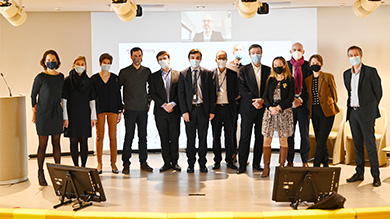Supporting advisers and investors has become more challenging than ever during the Covid-19 pandemic crisis.
Oliver Bilal shares some key learnings and experiences over the last six months and explains why finding innovative ways of working with colleagues and clients has been essential.
How is the ongoing Covid-19 crisis impacting asset management and the relationship you have with clients?
First of all, what we are witnessing today is unlike anything we have faced before. The other day, our head of UK sales, who has been in the industry for three decades and seen a lot of crises, told me he has never seen such a dramatic impact on the City of London. Shops, restaurants and cafes closed down, and most offices deserted; the ever booming & busting City of London that has survived bombings, terrorist attacks and the GFC – meaning global financial crisis, over the decades was brought to an abrupt halt by this pandemic. Our world has completely changed. And so has the asset management industry. Overnight, we had to move to a 100% digital relationship with our clients. Instead of our usual face-to-face meetings, which have been essential in building strong relationships and maintaining the clients’ confidence, we have had to find different and yet more frequent touch points to overcome the issue of being remote. In 2019 we had a total of 30,000 client related activities of which 28% were remote calls and video conferences. This year by September, we have already had 27,000 client activities of which more than 75% were remote. Another major change is the way we interact with them. Some clients, who were not fully equipped technology-wise, found the transition to be daunting, while others that were better equipped took part in creating a new and interesting experience. A key take-away from this new way of working is that our meetings are shorter and more efficient, with conversations more focused on business.
How have the investors reacted in the face of such a shock?
There are two key factors to bear in mind: the investment side and the emotional side. Let’s start with the investment perspective. The middle of March marked a serious turning point for investors as the markets plummeted. However, they immediately took advantage of lower entry points and added positions. On the investment side, clients mostly made neutral decisions based on their asset allocation. On the emotional side, everyone has been worried about the health situation and his or her own family situation, be it taking care of older relatives or keeping an eye on the kids while working from home. In these challenging times, it is important for our sales teams to consider this increased stress level of our clients too. Showing empathy and recognition will go a long way.
How have you needed to adapt to respond to the emergencies, concerns and needs of your clients?
Within the current situation, everything is connected to Covid-19. That includes the investment viewpoints and decisions. By the end of March, we had launched a dedicated website with whitepapers, videos, articles and other forms of content specifically on Covid-related topics. We wanted to provide our clients with complete clarity on how Covid-19 was shaping markets and macro events. It was very well received and gave us further verification that they required this type of support. Moreover, we established our ‘Natixis Access Series’ of event promotions, key insights and webinar playbacks, which tackle everything Covid-19 related, as well as market outlooks and topics on diversity, inclusion and leadership associated with our industry. The tricky part was around physical events, which we obviously couldn’t do anymore. Clients have expressed feeling fatigue with all the video conferences throughout the day. So, we innovated. We partnered with a virtual platform that has the capacity to host more than 600 participants and the look and feel of joining comes closer to a real conference. It includes a virtual lounge where you can chat with other participants and a virtual auditorium with 3D images including a signal requesting you to take your seat. It’s just like a real conference! Technology like this enables us to recreate more interactive, entertaining and inclusive gathering experiences. I believe that all the communications, support and new formats we provide to our clients are our competitive advantage.
Could you share with us an inspiring story or striking example?
Our core anxiety, since the beginning of March was: will we be able to sustain our business and most of all get new clients? In Asia, the lockdown happened earlier than in Europe. During that period, our Head of Sales in Korea started to work on a very exciting opportunity with WCM Investment Management, which is based on the west coast of the US. The entire pitch with this Korean client and our US American colleagues from first interaction to the final presentation went entirely digital. And we won! For me, it proves that business can still be done and that we can adapt our communications style to compensate for the lack of direct and personal interactions. We should remember that our peers and clients are in the same situation and that we are confident that we have the skills to perform and win.
Do you feel optimistic about 2021?
Yes, absolutely! And I am convinced that, at some point, we will meet in person again with our teams and investors. We will be back one day – yet this pandemic urges us to create added value for our clients while we are all in the same boat. To this end, I am proud of everyone’s great teamwork and our ability to consistently adapt and innovate.














